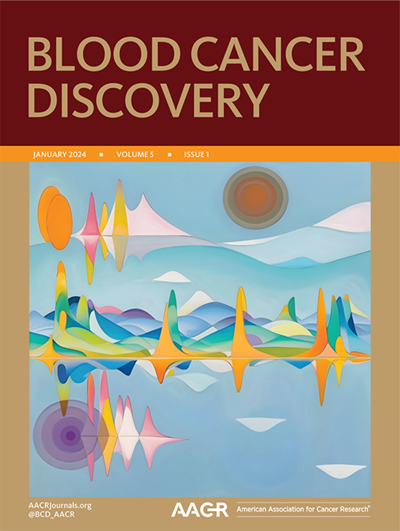摘要A16:基因工程小鼠的多组学分析揭示了造血干细胞和祖细胞中致白血病Idh和Tet2突变的不同和相反作用
IF 11.5
Q1 HEMATOLOGY
引用次数: 0
摘要
在髓系肿瘤中反复观察到IDH1、IDH2和TET2的突变。IDH1和IDH2编码异柠檬酸脱氢酶异构体,通常催化异柠檬酸转化为α-酮戊二酸(α-KG)。致癌IDH1/2突变赋予新形态活性,导致D-2-羟基戊二酸(D-2-HG)的产生,这是α-KG依赖性酶的有效抑制剂,包括TET甲基胞嘧啶双加氧酶。鉴于IDH1、IDH2和TET2突变在髓系肿瘤中的相互排他性,它们可能集中在一个共同的致癌机制上。与这一预期相反,我们观察到它们对基因工程小鼠的造血干细胞和祖细胞有不同甚至相反的影响。与Idh1R132H和Idh2R140Q相比,内源性Idh2R172K导致更高的D-2-HG产量。这导致了造血祖细胞分化的深刻改变,并导致骨髓增生异常综合征样疾病的发展,与Tet2−/-小鼠相比,存活时间更短。表观遗传学和单细胞转录组学分析表明,Idh2R172K和Tet2功能丧失对关键造血和白血病调节因子的表达和活性具有不同和相反的影响。值得注意的是,Idh2R172K细胞中的染色质可及性和转录失调与DNA甲基化改变部分断开。这些结果突出了IDH1/2和TET2突变的出乎意料的不同影响,这可能为基因型特异性疗法的发展提供信息。引文格式:Jerome Fortin,Ming Feng Chiang,Cem Meydan,Jonathan Foox,Parameswaran Ramachandran,Julie Leca,Francois Lemonnier,Wanda Y.Li,Miki S.Gams,Takashi Sakamoto,Mandy Chu,Chantal Tobin,Eric Laugesen,Troy M.Robinson,Annick You Ten,Daniel J.Butler,Thorsten Berger,Mark D.Minden,Ross L.Levine,Cynthia J.Guidos,Ari M.Melnick,Christopher E.Mason,Tak W.Mak。基因工程小鼠的多组学分析揭示了造血干细胞和祖细胞中致白血病Idh和Tet2突变的不同和相反作用[摘要]。载:AACR特别会议论文集:急性髓细胞白血病和骨髓增生异常综合征;2023年1月23日至25日;德克萨斯州奥斯汀。费城(PA):AACR;血液癌症Discov 2023;4(3_Suppl):摘要编号A16。本文章由计算机程序翻译,如有差异,请以英文原文为准。
Abstract A16: Multi-omic analyses in genetically engineered mice reveal distinct and opposite effects of leukemogenic Idh and Tet2 mutations in hematopoietic stem and progenitor cells
Mutations in IDH1, IDH2, and TET2 are recurrently observed in myeloid neoplasms. IDH1 and IDH2 encode isocitrate dehydrogenase isoforms, which normally catalyze the conversion of isocitrate to α-ketoglutarate (α-KG). Oncogenic IDH1/2 mutations confer neomorphic activity, leading to the production of D-2-hydroxyglutarate (D-2-HG), a potent inhibitor of α-KG-dependent enzymes which include the TET methylcytosine dioxygenases. Given their mutual exclusivity in myeloid neoplasms, IDH1, IDH2, and TET2 mutations may converge on a common oncogenic mechanism. Contrary to this expectation, we observed that they have distinct, and even opposite, effects on hematopoietic stem and progenitor cells in genetically engineered mice. Endogenous Idh2R172K caused much higher D-2-HG production compared to Idh1R132H and Idh2R140Q. This led to profound alterations in hematopoietic progenitor differentiation and to the development of myelodysplastic syndrome-like disease, with shorter survival compared to Tet2−/- mice. Epigenetic and single-cell transcriptomic analyses revealed that Idh2R172K and Tet2 loss-of-function have divergent and opposite effects on the expression and activity of key hematopoietic and leukemogenic regulators. Notably, chromatin accessibility and transcriptional deregulation in Idh2R172K cells were partially disconnected from DNA methylation alterations. These results highlight unanticipated divergent effects of IDH1/2 and TET2 mutations, which may inform the development of genotype-specific therapies.
Citation Format: Jerome Fortin, Ming-Feng Chiang, Cem Meydan, Jonathan Foox, Parameswaran Ramachandran, Julie Leca, Francois Lemonnier, Wanda Y. Li, Miki S. Gams, Takashi Sakamoto, Mandy Chu, Chantal Tobin, Eric Laugesen, Troy M. Robinson, Annick You-Ten, Daniel J. Butler, Thorsten Berger, Mark D. Minden, Ross L. Levine, Cynthia J. Guidos, Ari M. Melnick, Christopher E. Mason, Tak W. Mak. Multi-omic analyses in genetically engineered mice reveal distinct and opposite effects of leukemogenic Idh and Tet2 mutations in hematopoietic stem and progenitor cells [abstract]. In: Proceedings of the AACR Special Conference: Acute Myeloid Leukemia and Myelodysplastic Syndrome; 2023 Jan 23-25; Austin, TX. Philadelphia (PA): AACR; Blood Cancer Discov 2023;4(3_Suppl):Abstract nr A16.
求助全文
通过发布文献求助,成功后即可免费获取论文全文。
去求助
来源期刊

Blood Cancer Discovery
Multiple-
CiteScore
12.70
自引率
1.80%
发文量
139
期刊介绍:
The journal Blood Cancer Discovery publishes high-quality Research Articles and Briefs that focus on major advances in basic, translational, and clinical research of leukemia, lymphoma, myeloma, and associated diseases. The topics covered include molecular and cellular features of pathogenesis, therapy response and relapse, transcriptional circuits, stem cells, differentiation, microenvironment, metabolism, immunity, mutagenesis, and clonal evolution. These subjects are investigated in both animal disease models and high-dimensional clinical data landscapes.
The journal also welcomes submissions on new pharmacological, biological, and living cell therapies, as well as new diagnostic tools. They are interested in prognostic, diagnostic, and pharmacodynamic biomarkers, and computational and machine learning approaches to personalized medicine. The scope of submissions ranges from preclinical proof of concept to clinical trials and real-world evidence.
Blood Cancer Discovery serves as a forum for diverse ideas that shape future research directions in hematooncology. In addition to Research Articles and Briefs, the journal also publishes Reviews, Perspectives, and Commentaries on topics of broad interest in the field.
 求助内容:
求助内容: 应助结果提醒方式:
应助结果提醒方式:


